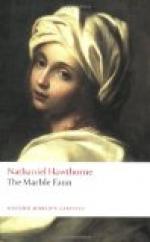She would not have banished one of those grim popes, who sit each over his own tomb, scattering cold benedictions out of their marble hands; nor a single frozen sister of the Allegoric family, to whom—as, like hired mourners at an English funeral, it costs them no wear and tear of heart—is assigned the office of weeping for the dead. If you choose to see these things, they present themselves; if you deem them unsuitable and out of place, they vanish, individually, but leave their life upon the walls.
The pavement! it stretched out illimitably, a plain of many-colored marble, where thousands of worshippers might kneel together, and shadowless angels tread among them without brushing their heavenly garments against those earthly ones. The roof! the dome! Rich, gorgeous, filled with sunshine, cheerfully sublime, and fadeless after centuries, those lofty depths seemed to translate the heavens to mortal comprehension, and help the spirit upward to a yet higher and wider sphere. Must not the faith, that built this matchless edifice, and warmed, illuminated, and overflowed from it, include whatever can satisfy human aspirations at the loftiest, or minister to human necessity at the sorest? If Religion had a material home, was it not here?
As the scene which we but faintly suggest shone calmly before the New England maiden at her entrance, she moved, as if by very instinct, to one of the vases of holy water, upborne against a column by two mighty cherubs. Hilda dipped her fingers, and had almost signed the cross upon her breast, but forbore, and trembled, while shaking the water from her finger-tips. She felt as if her mother’s spirit, somewhere within the dome, were looking down upon her child, the daughter of Puritan forefathers, and weeping to behold her ensnared by these gaudy superstitions. So she strayed sadly onward, up the nave, and towards the hundred golden lights that swarm before the high altar. Seeing a woman; a priest, and a soldier kneel to kiss the toe of the brazen St. Peter, who protrudes it beyond his pedestal for the purpose, polished bright with former salutations, while a child stood on tiptoe to do the same, the glory of the church was darkened before Hilda’s eyes. But again she went onward into remoter regions. She turned into the right transept, and thence found her way to a shrine, in the extreme corner of the edifice, which is adorned with a mosaic copy of Guido’s beautiful Archangel, treading on the prostrate fiend.
This was one of the few pictures, which, in these dreary days, had not faded nor deteriorated in Hilda’s estimation; not that it was better than many in which she no longer took an interest; but the subtile delicacy of the painter’s genius was peculiarly adapted to her character. She felt, while gazing at it, that the artist had done a great thing, not merely for the Church of Rome, but for the cause of Good. The moral of the picture, the immortal youth and loveliness of virtue, and its irresistibles might against ugly Evil, appealed as much to Puritans as Catholics.




